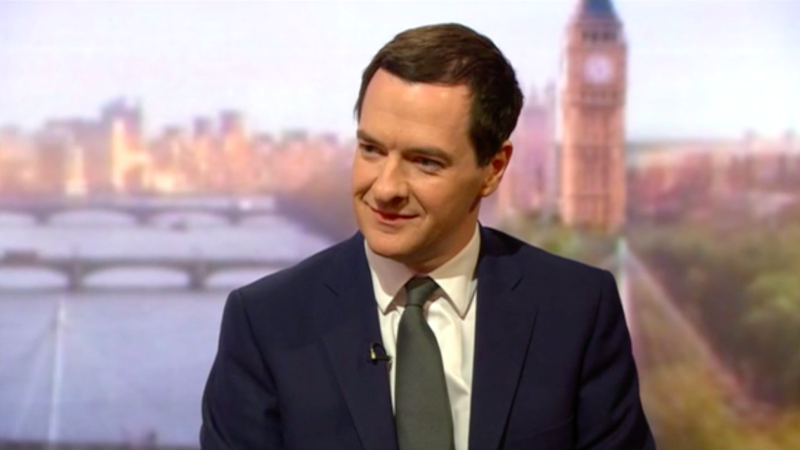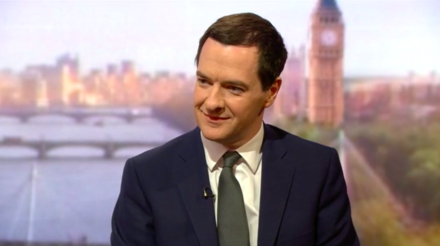
George Osborne’s idea of a law to ban the government from borrowing in good times would be a silly piece of legislation. For one thing, it displays incredible ignorance about the principles of Britain’s constitution. Unlike Germany, the USA or India, parliament cannot make a fundamental law that dictates the shape of other pieces of legislation, including each year’s budget act. But like most of Osborne’s schemes, the point is not the act itself but the moves it forces his opponents to make. Labour has a choice between looking profligate or like Tory poodles. Bad law, smart politics.

But, as ever, Osborne’s problem is good tactics with no strategy, and that’s where he can be defeated. Osborne, and the rest of this Conservative government, have no bigger economic plan. The Britain they want to see is Britain as it is now, just with a balanced budget. The reality of the last five years is that living standards now are no higher than they were in the middle of Britain’s great recession. Personal debt is increasing, and the prospects for young people terrible. The coalition has reduced the deficit – a little – but it hasn’t dug Britain very far out of the economic hole it was in 2010.
There are big, structural things wrong with Britain’s economy: low productivity, a shortage of skilled workers, low investment in capital goods, no attention to things like food production and industrial plant, an obsession with shiny innovation at the expense of the foundations. Our coffee shops, boutique hotels and app makers are still doing well, but they don’t provide foundations for the nation’s wellbeing. Britain’s current record on exports is terrible.
The point, of course, is that these can’t be blamed on any one government deskilling and deindustrialisation of Britain started in the 1970s, later than most people think, but it started before Thatcher. The big bang and the growth of a madly rich internationally-owned square mile allowed us to imagine we didn’t need to make to earn. The delusion of the ‘knowledge economy’ in the 1990s and early 2000s meant businesses didn’t invest in producing the things keep life going (food, housing and clothes, for a start).
There were exceptions of course – the car industry, whose resurgence happened when Peter Mandelson was business secretary, is one. But for the most part, our political leaders abdicated all sense of responsibility for the direction our economy should go.
The trap we need set for Osborne is say this is not good enough. In our second term in opposition, we need to move the debate from the deficit to the real economy, and present the Labour party as the answer to the long-term mess Britain is in. The plan – and it will take years to create – will put training in technical skills at the heart of British education; create new institutions able to capitalise firms; build the institutions and networks which support long-term thinking about the direction of different sectors and regions.
Above all, we need to create a shared capacity amongst government business to coordinate: a series of industrial strategies, for the want of a better word, written not by the fiat of bureaucrats but through negotiation between business, unions and government. In the face of a sharp plan articulated by shadow ministers and local politicians who really understand how business and the economy work, Osborne would be a floundering mess.
But the trap will only work if we start by attacking the record of the last Labour government hard. Yes, we improved public services, marginally reduced poverty, introduced a minimum wage – things I am very proud of. But we did not recreate British centres of manufacturing, incentivise investment in retail or food, lead a resurgence in the country’s exports. As mired in the same short-term thinking as everyone else we made no big offer to British business that helped them collaborate, plan and invest for the long term (the car industry is the exception that shows what could have been done).
We need to admit that yes, Labour did spend too much. After Gordon foolishly abandoned prudence, too much cash was flung at the public sector without adequate control. Yes, we will meet far tighter fiscal targets in government. But both of those things miss the main point. As the IPPR argued, Britain suffered badly in the crash because our tax revenue was based on such unsustainable sources, on industries that benefited from high asset prices, and financial services. The problem, in fact, was far deeper and more fundamental than a few years of raised public spending.
Labour’s success now – our survival in fact – depends on facing up to the failures of 2010-15 first of all. But part of that reckoning needs to be with what happened in the Labour government before. The Tories can be defeated if we attack their record for presiding over such abyssal growth over the last few years. But the trap we set, is to get real about our own failures in government, and then attack Osborne for continuing the same mistakes since.
The issue is not austerity. It is that successive governments have allowed the evaporation of the sustainable sources of British economic growth.




More from LabourList
Government abandons plans to delay 30 local elections in England
‘The cost of living crisis is still Britain’s defining political challenge’
‘Nurses are finally getting the recognition they deserve’